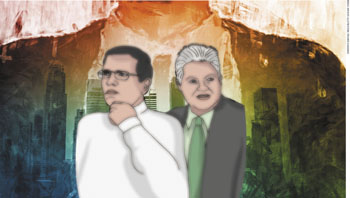STATE OF THE NATION
THE ROAD TAKEN AND ROADS YET TO BE TAKEN
Wijith DeChickera scrutinises the government’s emerging ethos and notes a pitiful bifurcation in parties, policies and programmatic development

Sometimes I yearn for a simpler ethos in local politics. There was a time when a lay observer of parliamentary goings-on could easily discern the good from the bad, and distinguish the men from the boys in terms of grown-up policies developed and implemented in the national interest.
Perhaps mere sentiment for purer separation and the division of powers clouds one’s judgement and perceptions in a milieu where coalition politics cast a long shadow over local law-making. But there is a sense that a glory has passed from the corridors of power, and that there’s no telling the difference between the good, bad and ugly nowadays.
As recently as a decade ago, there was a clear distinction between those who favoured media freedom and civil liberties on the one hand, and those who militated against free speech and civil society advocacy on the other. The latter were in government; the former in opposition.
Today, the erstwhile champions of a million freedoms are inexplicably seeking to curtail the very liberties for which they campaigned long and hard. It is no longer a Rajapaksa-led demagogic cabal that is thumping its chest like Neanderthals in oestrus about enforcing a draconian Prevention of Terrorism Act (PTA).
It is rather an ostensibly democratic Sirisena-Wickremesinghe combine that is apparently drafting arguably more repressive laws that run counter to the principles which they once espoused on a long-forgotten campaign trail.
TERRORISM REDUX – JUSTIFIED? This irony is a classic example of the new fault line in contemporary legislation that is in the making at the time of writing. There are those in government – leftover from the dregs of the previous regime’s ignominious departure – who among others of their ilk in the ruling party are perhaps driving the agenda in a dangerously subversive way.
Be that as it may, the UNP of late has quite regrettably come to be identified with a repressive mindset that’s alien to the colours it flew on its mainmast those many years it was a lone voice for a return to constitutional republicanism.
In the person and work of its justice minister in particular and jejune members of parliament in general, it is drafting counterterrorism laws that will possibly usher in a new reign of terror – in the wrong hands.
Included in the prospective reforms are provisions whereby suspects once arrested have no recourse to legal counsel until a first statement is recorded, confessions extracted under police ‘interrogation’ (‘torture,’ some may say) are admissible in a court of law and definitions under which activities that “threaten unity” of the state can be interpreted as hostile to the incumbent administration.
Where the PTA was identifiably draconian (a favourite description of its critics), the proposed legislation is diabolical. If enacted, it will effectively seal the fate of all dissenters and other political opponents who dare to speak out against the authoritarian, antidemocratic element that appears to be extant in government’s remnant but declining democratic-republican ethos.
The laws would necessarily undermine the nation’s efforts to regain GSP+ concessions in a European milieu that is increasingly sensitive to human rights issues and has already placed our beleaguered republic on a back-burner if not a black list.
TRANSITIONAL JUSTICE – RATIFIED? Another area in which the dichotomy between the government’s thinking and its actions is in the much-discussed but arguably poorly understood area of ‘transitional justice’ (TJ), as the nation is yet to name it (for example, much like other catchwords of the past – such as ‘negotiated settlement,’ ‘devolution,’ ‘federalism,’ ‘CFA,’ ‘P-TOMS’ and ‘zero-civilian casualties’ – it means many things to many lovers of its short, happy life).
Although there has been slow but steady progress – the enactment of the Office of Missing Persons (OMP) Act being a salutary showcase of this – there’s a sinking feeling in certain quarters about the impact the constitutional reforms in this arena are making.
Concerns about timing persisted at the close of 2016 that may well be alleviated as the new year gets cracking and government privileges getting right the content of its new social contract – rather than work rigidly towards conforming with democracy’s self-imposed deadlines, its supporters’ partisan schedules and the timetable of an inevitable march towards transitional justice.
The president’s assigning of the OMP arena to a subject minister and the operationalising of relevant clauses in the act could serve to ratify the government’s commitment to expediting the cause of TJ.
Au contraire, the state’s puzzling apathy over prosecuting offenders of hate-speech and violent crimes under prevalent laws – vide the ICCPR Act of 2007 that conforms to international norms – sends out a contrary signal.
Rather than return to the drawing board to reinvent the wheel, perhaps state law enforcement authorities would do well to signify their convictions by placing under lock and key those religious fundamentalists or political extremists who threaten, solicit or incite ethno-nationalist chauvinism.
Until and unless this happens, simpler folk such as this columnist must be forgiven for assuming that the fault lines in government underscore a deep divide in coalition ideology: a fissure that could crack open parties as much as a hard-won peace.



